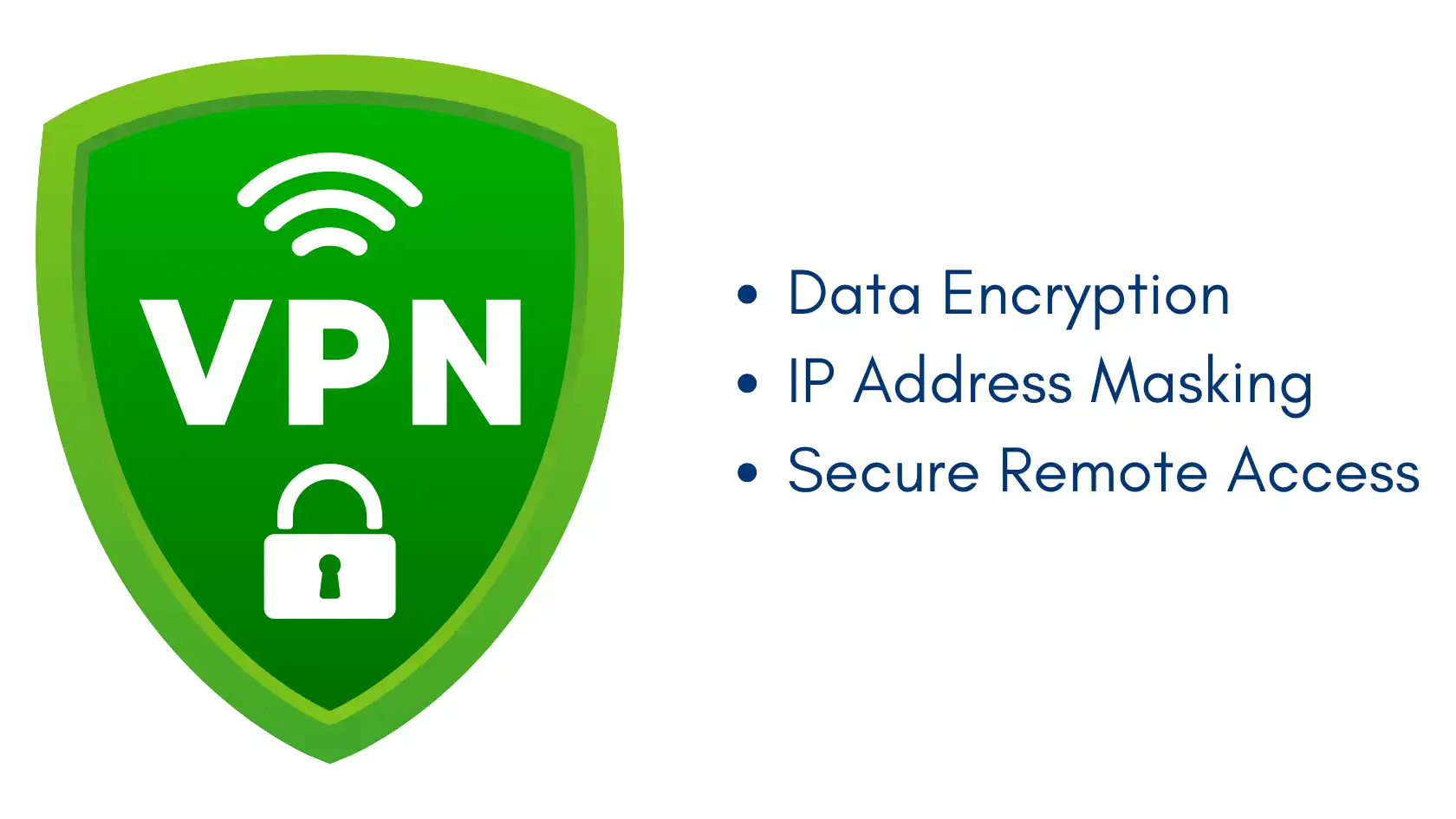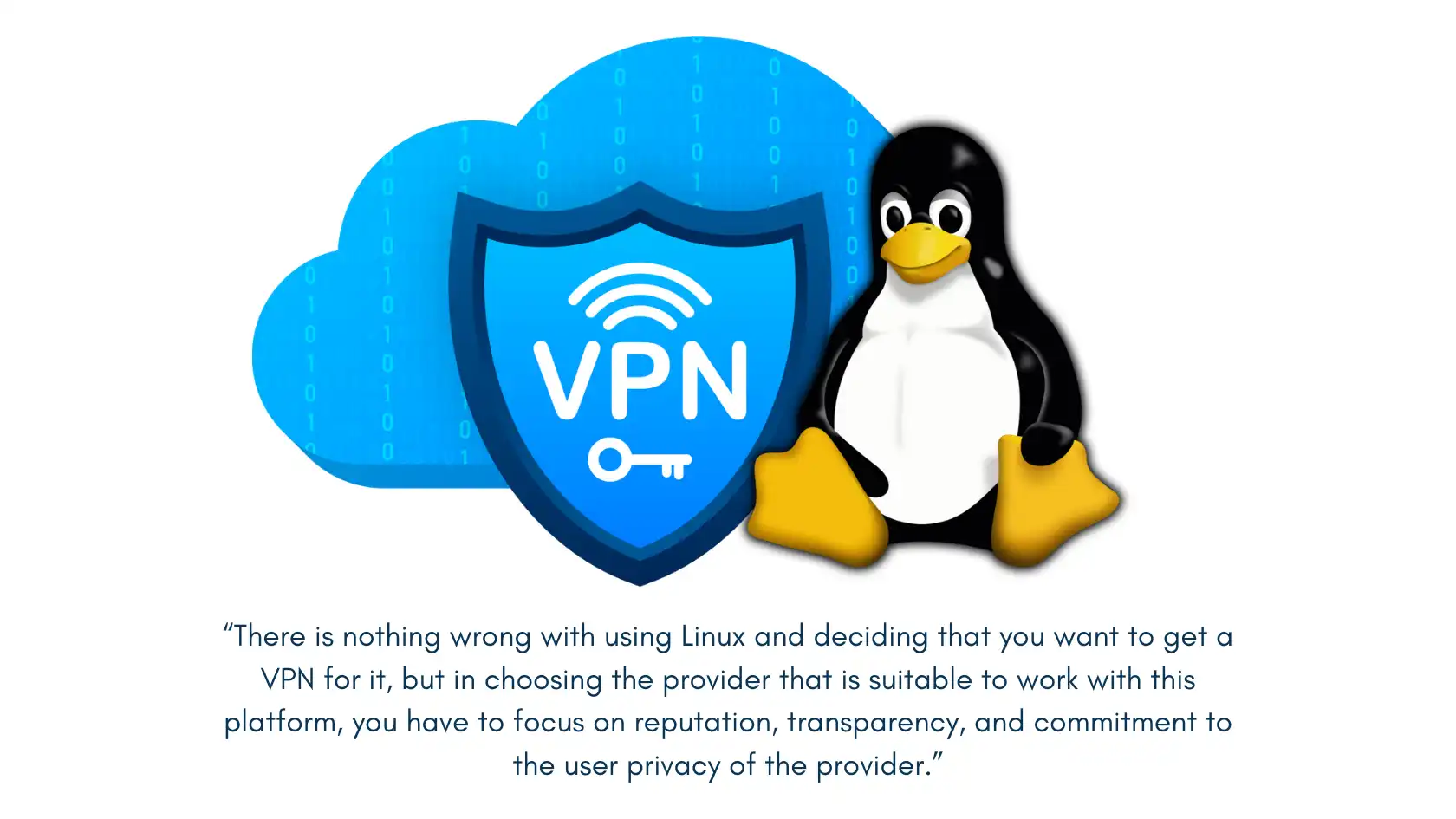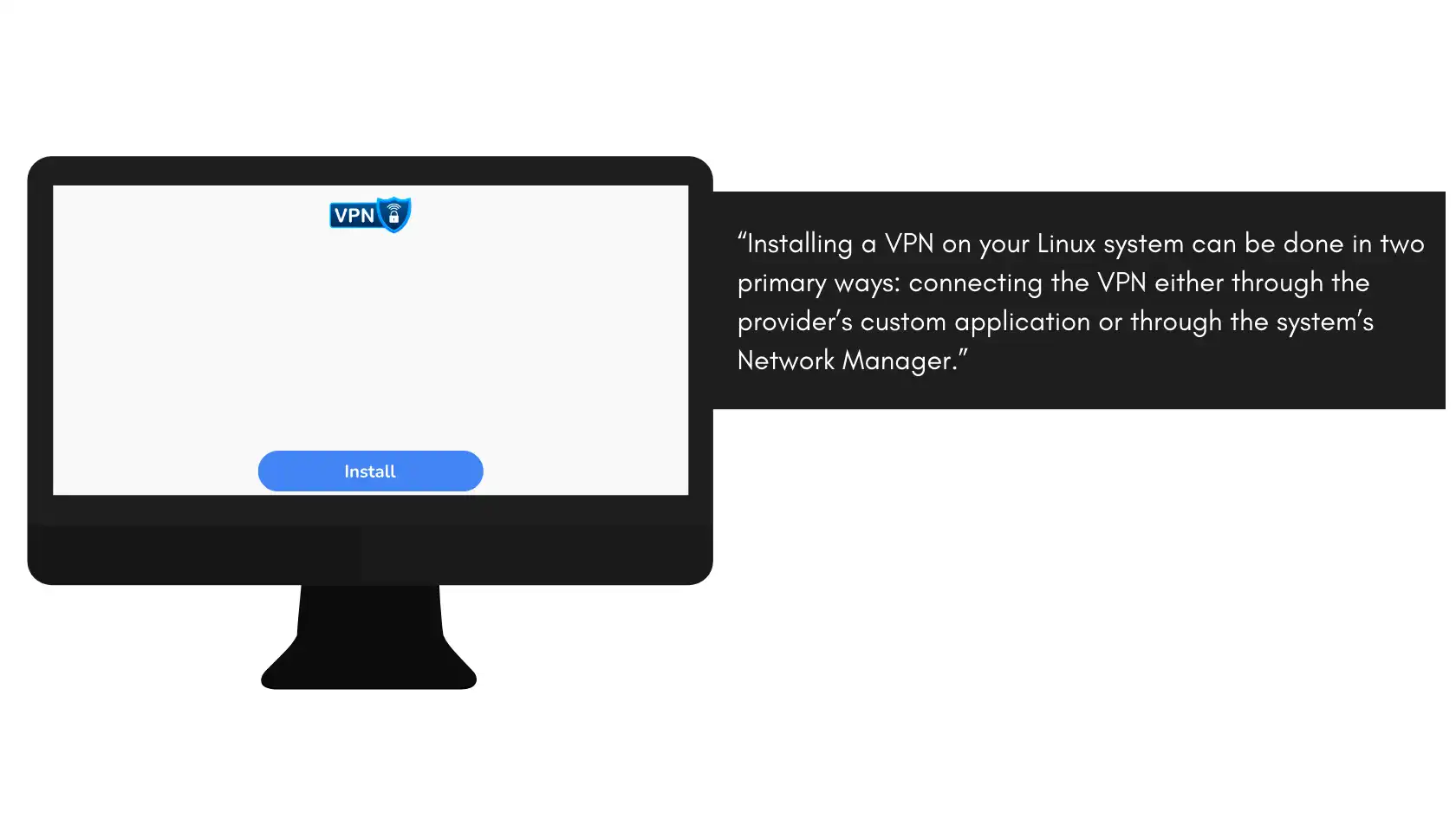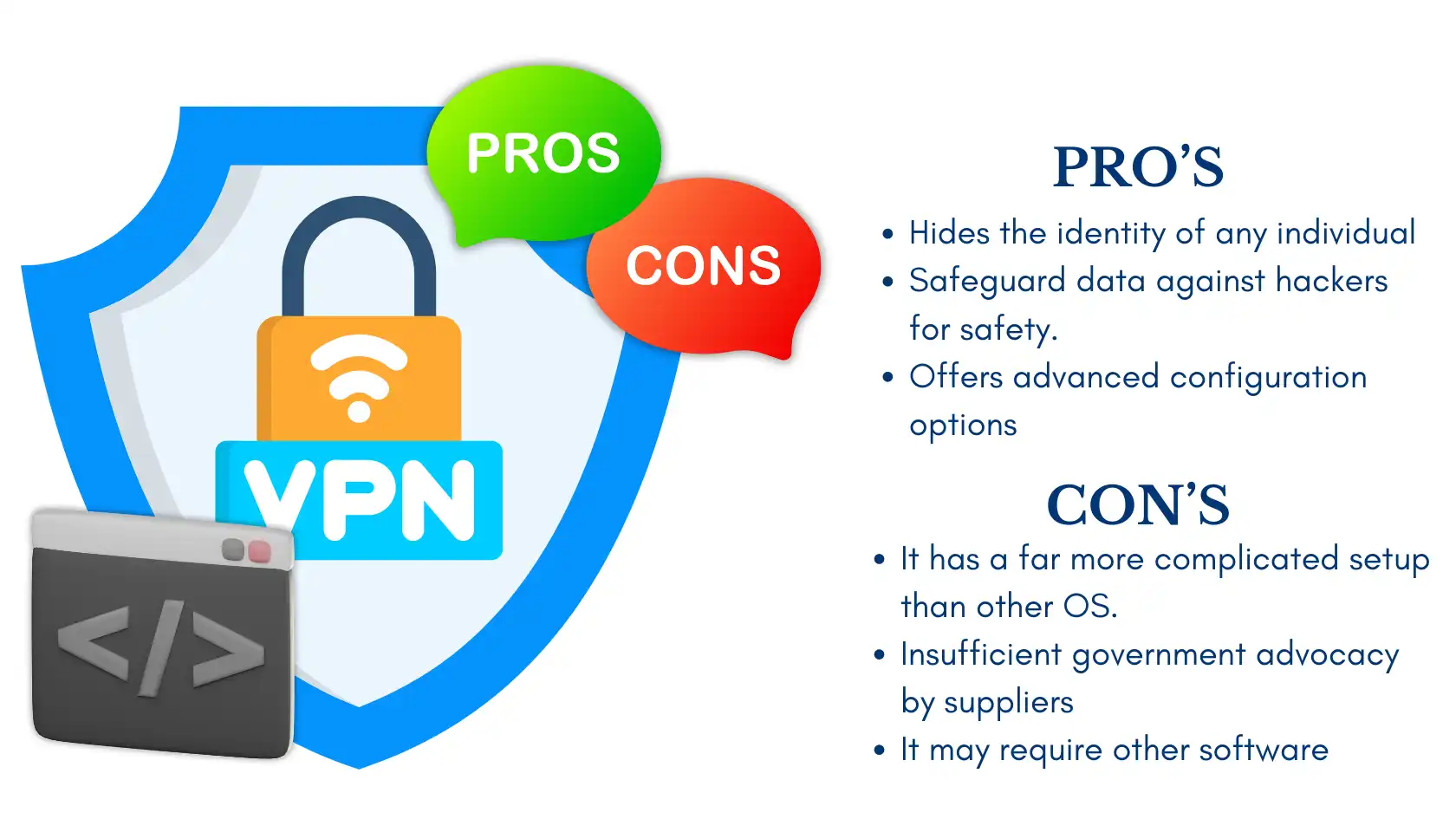A Virtual Private Network (VPN) is a technology that defines a secure and encrypted connection from a device to a network over the internet.
You can easily set up a VPN on Linux to establish this secure link, which gives protection to enhance the transfer of data through the internet so that the data cannot be intercepted or monitored by unauthorized persons.
VPNs are generally employed for anonymity on the internet and for the unblocking of contents and secure connections, particularly on public Wi-Fi.
Purpose Of A VPN

Data Encryption: VPNs resolve internet traffic through encryption, highlighting the importance of data encryption. Hence, it becomes impossible for a third party like hackers or ISPs to monitor the activity or gain access to a person’s information when setting up VPN on Linux.
IP Address Masking: Using a VPN software means that all its users can manipulate their internet traffic through a VPN server to veil their IP address, making them more secure online.
This in turn protects against tracking as well as profiling by advertisers as well as other stakeholders.
Access to Restricted Content: VPN helps to unblock the content that would otherwise be unavailable to the user because of the limitations of the country or region they are in, for instance, streaming services or websites.
Secure Remote Access: VPNs offer the means through which employees can access company networks and transfer company data from anywhere without compromising the data.
Setting up a VPN for remote work on Linux provides a seamless and secure method, ensuring data protection and privacy for users.
Reasons as to Why Linux Should Embrace VPN Use for Privacy and Security
Using a VPN on Linux is particularly important for several reasons:
Enhanced Security: Hence, while popular as reliable operating systems, Linux systems remain open to different forms of cyber threats.
A Linux VPN setup affords the client extra protection as regards data encryption and safeguards against possible cyber-attacks when accessing public Wi-Fi.
Privacy Protection: Those who prefer Linux are usually concerned about privacy.
A Linux VPN setup guarantees that people’s activities on a network are hidden from ISPs and anyone else who wants to monitor them and collect their data.
This is especially blessed for those who undertake activities on the Internet and wish to remain anonymous.
Access to Global Content: Some of the Linux applications and services can have some restrictions depending on the region.
Using a VPN, the number of resources that a user can use is increased because, through the servers, the user can connect to a different location.
Secure Remote Work: To any person practicing Linux in telecommuting, VPN is crucial in remote connections to organizations and databases.
This becomes important more so with technical disciplines with special emphasis on issues such as data protection guidelines.

- Lightning-fast speeds to browse without lag
- Servers in 105+ countries around the globe
- Military-grade security to stay safe online
- Try it risk-free with its money-back guarantee
- Native apps for all major devices
Why It Is Wise To Choose A Good VPN Supplier For Linux

It is therefore important for Linux users to rent their VPN services from reliable service providers to ensure that their rights as users are observed.
A reliable VPN ensures the traffic that passes through the device is encrypted and the actual IP address of the device is concealed in a way that hackers, government, and ISPs cannot disturb.
When setting up VPN on Linux, choosing a trustworthy provider becomes even more crucial for maintaining privacy and security.
There is nothing wrong with using Linux and deciding that you want to get a VPN for it, but in choosing the provider that is suitable to work with this platform.
You have to focus on reputation, transparency, and commitment to the user privacy of the provider.
Privacy has emerged as a major factor to consider while selecting a VPN service by checking for third-party VPN audits, adhering to a no-logs policy.
And ensuring the provider supports setting up VPN on Linux and is located in privacy-friendly jurisdictions.
Major Characteristics to Look at While Selecting a VPN for Linux
Linux Compatibility: Make sure that the VPN provider has a specific app for Linux, or at least supports installing a connection manually for your Linux distro.
If you are unsure how to proceed, many VPN providers offer guides on how to set up VPN on Linux for seamless installation.
Encryption and Security: Seek those that offer AES-256 encryption and that have a secure tunneling protocol like WireGuard or modifications thereof (NordLynx or Lightway).
It would also be nice to have a kill switch that would pause data transmission if the connection to the VPN is severed.
Speed and Performance: Select a VPN with lots of server locations to minimize the connection laptop and boost your internet speed.
Thus, it is advisable to conduct the performance test of the VPN on the available Linux machine.
Server Locations Having multiple servers means that the users get to hand: unblock access to the content that is restricted in their location, avoid censorship,and gain access to the fastest server.
Torrenting Support: If, for any reason, you often engage in P2P sharing, choose a VPN with a torrent-friendly server and a strict no-logging policy.
Additional Features: Search for additional options like split tunneling – that is when you can use particular applications through the VPN while utilizing the traditional connection on the other apps.
User-Friendly Interface: The user interfaces like a well-designed Linux app or Command Prompt-like interface can even add a lot to using the VPN.
A clear guide on how to set up VPN on Linux can further enhance the user experience for beginners.
Pricing and Money-Back Guarantee: The price plans should also be compared and the plans should be looked at in VPNs that provide a money-back guarantee.
Which would enable the potential client to try out the service before signing up for a long-term
Taking all these features into account and focusing on secure VPN provider choice, Linux users are free to get more anonymity and privacy while enjoying all the perks of the provided OS.
Installing A VPN On Linux

Installing a VPN on your Linux system can be done in two primary ways: connecting the VPN either through the provider’s custom application or through the system’s Network Manager.
Here are further elaborations of the two approaches:
Using the VPN Provider’s App
Ask Provider To Develop a Linux Application
Before moving further, ensure that the VPN service you have selected offers its services in the form of a dedicated application for Linux.
Most reputable providers do, and they provide installation guides more specialized for different Linux distributions to help you easily install VPN on Linux.
What You Need to Do to Download and Install the App
- Visit the VPN Provider’s Website: Visit the website of your VPN service provider.
- Download the Installer Compatible with Your Linux OS: Find the downloads tab and choose the Linux installer you wish to download (for example Ubuntu, Fedora, Ar, ch, and so on).
- Open the Terminal: Press CTRL + ALT + T to open the terminal.
- Use the cd command: to change to the directory where the installer was downloaded. For example:
- Make the Installer Executable (if necessary): If the downloaded file is not executable, you can make it executable with the following command (replace installer-file with the actual file name):
- Run the Installer: Execute the installer using the following command:
- Launch the VPN and Log In: After installation & on the first use of the VPN apps you can see them under the application menu of your device. Run it, enter the username and password the program is to use, and go through any initial configuration processes to install VPN on Linux successfully.
Using Network Manager
If the VPN provider lacks the application for use in Linux, then it will be able to employ the VPN using the system Network Manager.
It can work with different VPN protocols, including, for example, OpenVPN or WireGuard, when setting up VPN on Linux.
- Open the Network SettingsThe network icon can be found at the right corner of your screen right-click it and choose ‘Settings’ or ‘Network Settings’.
- Click the Plus (+) Sign to Add a New Connection: The network connection setting can be done by searching for an additional sign or the word ‘Add’ symbolic in the setting fast lane.
- Select the VPN Protocol: Select the type of connection from the list of available ones, in case you want to use a VPN protocol such as OpenVPN or WireGuard when setting up VPN on Linux.
- Enter the Required Information from the VPN Provider: Some of the particulars that you are expected to give include the ones that your VPN Provider would have provided in the following manner;
- Connection Name: A name that is to be given to the VPN connection.
- Gateway: The IP address of the server that is utilized in the construction of the VPN.
- Username: They took details such as Informant’s VPN account username.
- Password: VPN account password with which you log into your VPN account.
There may be additional fields to consist of certificates or keys of some form, as you should take note based on the protocol to be applied.
- Save the Configuration: On the completion of filling the field, use the save button to assist in the setting up of all the varied inputs that have been made in detail.
- Connect to the VPN: You can now begin to connect to the VPN by selecting it in the network and pressing the connect button.
Pros And Cons Of Configuring The VPN On Linux

Pros
- Hides the identity of any individual, enciphers data for privacy
- Safeguards data against hackers for safety
- Can be used to avoid geographical restrictions on the content to be viewed
- Called ‘third-party web access’ to help avoid ISP throttling and have better connection speeds
- >Offers advanced configuration options
- Maintains privacy while torrenting
Cons
- Far more complicated setup than other OS
- Insufficient government advocacy by suppliers
- Possible slowing in speeds resulting from encryption
- Not all features are supported when Steam is running under Linux
- May require other software to set up to get it to run
Real-Life Scenarios Illustrating The Importance Of Using A VPN On Linux
Remote Work Security: An application development company’s employee codes and accesses company data at a home office running Linux.
To make their internet connection safe as well as protect it from different types of cyber threats, they set up a VPN on Linux.
This enables them to work from different locations without compromising on their information as they connect to different other public networks.
Privacy-Conscious Browsing: A writer applies Linux while looking for information that might put him/her in a compromising position.
After they set up a VPN on Linux, they surf the internet while having no record that could be monitored by the service providers or other security bodies.
Accessing Geo-Restricted Content: A Linux user is from a country where internet filtering is prevalent, and there is no domestic streaming service to which he wants to subscribe.
Using a VPN service, they can’t connect to a server in another country and watch these programs without limitations.
Torrenting Safely: A Linux enthusiast downloads applications and Linux distributions through torrents on computer.
To preserve anonymity and to not receive copyright infringement notifications, they utilize VPN with servers for P2P traffic which allows them to hide their real IP address while sharing files.
Avoiding Bandwidth Throttling: A gamer on Linux is able to play games online but when connection is throttled which causes lags.
This way they can mask the gaming traffic hence the ISP cannot restrict them and extraneously enhance their gaming experience.
Traveling Abroad: A Linux user planning to visit a country with strict restrictions on internet usage wishes to browse through news sites and other social networks that he or she likes.
Using this, they can be able to access a server in their home country and get updates from there.
Of course, all these scenarios illustrate how a VPN can improve security, privacy, and content availability for Linux in real-life scenarios.

Uninterrupted, high-speed browsing, zero logs so your online activity is always private.
Over 7000 people checked out NordVPN in the last month
Case Studies Of Using VPNs For Linux Users
Case Study 1:
Ways of Improving Security for the Employees Working from Home
90% of a remote Software Development team working predominantly in Linux experienced security threats after attempting to transfer some sensitive information belonging to the company downloaded over public Wi-Fi.
They had to set up NordVPN which is known to be tested for its efficiency on different distributions of Linux.
They noted that the high level of security that comes with their systems such as AES-256 encryption and the strict no-logs policy was propitious in the enhancement of data protection when working remotely with the help of NordVPN.
It was easy to install, and the interface is friendly, which makes the team work without having to worry about hacking incidents.
Case Study 2:
An example of Linux being used is a journalist in a country where Internet censorship is very likely to occur and uses Linux to conduct research and writings of articles.
For unblocking of websites and gaining secure connection they selected ExpressVPN after going through the offered features for Linux.
With the help of ExpressVPN, the journalist avoided tracking and got necessary information despite geo-restrictions due to the extensive server network and robust security measures.
This case shows how the use of VPN can put power in the hands of the users to be able to continue to freely access information even in hostile environments.
Case Study 3
Safe Torrenting for Open Source Developers
The example of using an open-source software developer is a frequent downloader of hefty files via torrents on his/her Linux-based work-station and regularly seeded the files.
They decided to go with IPVanish because of its P2P-friendly servers and sound attitude towards users’ privacy.
The value that IPVanish provided the developer was that he/she was able to download files safely without revealing his/her IP address and therefore avoid being surrounded by copyright infringement notices.
The overall concept of this case shows how crucial VPN is when it comes to matters of privacy especially when dealing with files.
Recent News Articles Related To Using VPNs On Linux:
Linux VPN usage rises as privacy concerns grow.
Published: August 15, 2024
According to the data collected by the Linux Foundation in the last year, Linux users turn to VPN much more frequently than before.
According to the report, the primary reasons that make this shift critical include Rising Privacy Concerns, Censorship, and SMBs need for Secure Remote Work.
A list of providers of Linux VPNs includes NordVPN, ExpressVPN, and other VPN services which have been flooded with downloads of Linux distributions, coupled with apps and set-up totes.
Proton VPN confirms new Linux graphical user interface app
Published: July 20, 2024
Proton VPN, which is a VPN service that carries out its operations with a focus on user privacy/ anonymity has unveiled its new graphical user interface (GUI) application created for the Linux operating system.
Current planned distributions are Ubuntu, Fedora, and Arch Linux; the app wants to be the Graphical VPN client for users who do not like CLI.
The launch has been made at an appropriate time given the rising need for easy-to-use VPN solutions in Linux environments.
Following are the merits of using free Linux Distros in the latest releases:
Published: June 5, 2024
Some of the leading Linux distributions such as Ubuntu and Fedora have taken it upon themselves to make VPN integration a day’s business.
These distros now support established VPN protocols, such as OpenVPN and WireGuard, through GUI options, so the user may connect to his/her VPN service under the network settings.
Such action from the developers may spark the interest of more Linux users to use VPNs to boost their privacy and security.
FAQs
Why does Linux need a VPN?
Does a free VPN Linux exist?
Does it mean that Linux has its own built-in VPN or it is missing from it?
Are VPNs expensive?
Conclusion:
Therefore, the use of a VPN on Linux is vital in improving the users’ privacy and security when using the internet.
As people’s awareness of their rights on the internet has escalated, a good VPN will offer the necessary apparatuses for protecting the user’s information.
So, the specific features include the ability to encrypt data, IP masking, and secure remote access either through the applications or the system.
For those looking to set up a VPN on Linux, it is crucial to select a reliable service.
Since the need for privacy-enhancing solutions is increasing, choosing a reliable VPN service that would fit certain criteria would enable Linux users to confidently surf the internet securely.
Accepting a VPN is a good measure towards the safe use of the internet.






